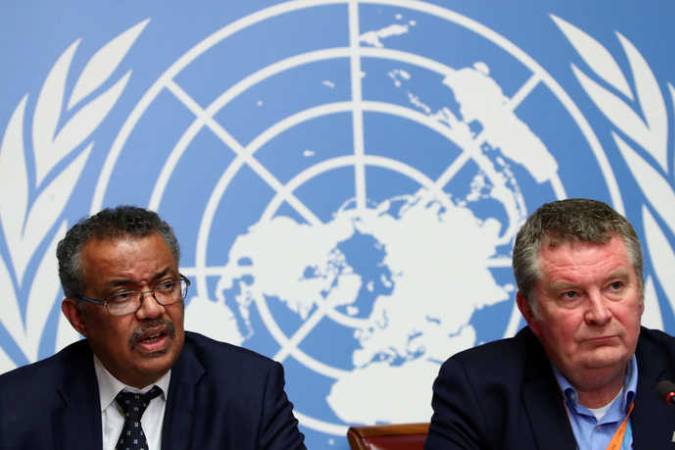WASHINGTON - The reported number of new coronavirus cases eased Tuesday in China, but the death toll from the infections still rose to nearly 1,900, including the director of a hospital at the epicenter of the outbreak.
Chinese officials reported 1,886 new cases, the first time the daily figure had dipped below 2,000 since late January, but the overall figure now totals more than 72,000. A total of 98 new deaths were reported, the first time the figure had dropped below 100 in a week.
Among the deaths was Liu Zhiming, the director of Wuchang Hospital in Wuhan, the capital of Hubei province that is at the center of the outbreak.
World Health Organization Director-General Tedros Adhanom Ghebreyesus said the Chinese coronavirus figures appear "to show a decline in new cases" but emphasized the new data "must be interpreted very cautiously."“
We don’t have enough data on cases outside China to make meaningful conclusions,” Tedros said. A Chinese pulmonologist predicted the number of infections will level off, rather than falling further, after hitting a peak later in February.
Tedros also said more than 80% of patients "have mild disease and will recover."
The coronavirus outbreak continued to wreak havoc around the world. WHO reported that outside China there are now 804 cases in 25 countries, with three deaths.
Russia said starting Thursday it would ban all Chinese from entering its territory.
Tatiana Golikova, the deputy prime minister for health, said the decision was necessary "because of the worsening epidemic in China and the fact that Chinese nationals are continuing to arrive on Russian territory."
U.S. Secretary of State Mike Pompeo said it took the United States “too long to get the medical experts into” China to help combat the outbreak.
On a visit to Africa, Pompeo said, "We hope that every country that has information, this includes China, will be completely open and transparent ... We are hopeful that the Chinese government will increase its transparency [and] will continue to share this information.”
Global stock markets mostly fell Tuesday after American technology giant Apple reported the coronavirus was hurting its revenues and that it would not meet its March sales forecast.
The U.S. said Monday it had evacuated more than 300 of its citizens and their immediate family members who had been on board the Diamond Princess cruise ship. One flight carrying the passengers arrived early Monday at Travis Air Force Base in California, while another landed hours later at Lackland Air Force Base in Texas.
A group of 14 people who did not show symptoms, but did test positive for the virus, were allowed on the flights in an area isolated from the rest of the passengers. All of the evacuees are being held under quarantine for 14 days.
Australia announced Monday it would also be evacuating its citizens from the ship. Canada, Italy, South Korea and Hong Kong are planning their own evacuation efforts.
The U.S. State Department is also looking into the case of a U.S. citizen who was diagnosed with the coronavirus after departing another cruise ship, the Westerdam, whose passengers tested negative for the virus before disembarking in Cambodia.
Malaysian medical authorities said the passenger, an 83-year-old woman, twice tested positive for the virus upon arriving in Malaysia after showing signs of a viral infection, a State Department spokesperson said Sunday. She is the first person from the Westerdam to test positive. Her husband tested negative.
The spokesperson said U.S. authorities do not have "sufficient evidence to determine when the passenger may have been exposed and where." The American patient remains in Malaysia where she is receiving treatment.
While China has recently been complimented for the way it has handled the outbreak and its efforts to contain it, the WHO is still asking for more information on how China is making its diagnoses.
Chinese state media Saturday published a speech President Xi Jinping made Feb. 3 that shows Chinese authorities knew more about the seriousness of the coronavirus at least two weeks before it made the dangers known to the public. It wasn't until late January that officials said the virus could spread among humans.
In a Jan. 7 speech, Xi ordered the shutdown of the cities most affected by the virus. Those lockdowns began Jan. 23.
(VOA)

